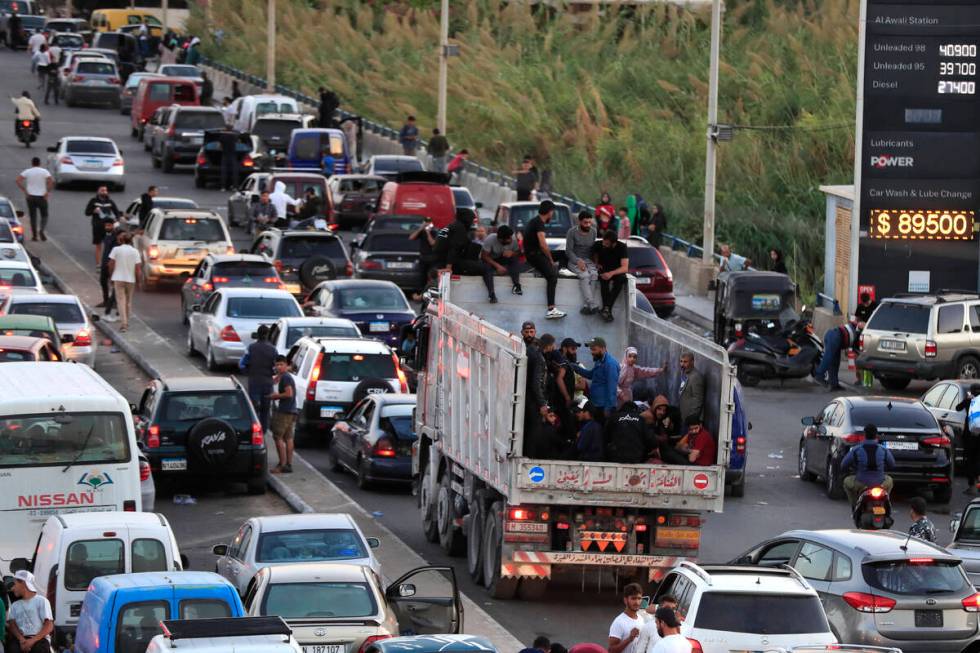Israel bombards Hezbollah as conflict widens

BEIRUT — Israel killed a top Hezbollah commander Tuesday as part of a two-day bombing campaign that has left more than 560 people dead and prompted thousands in southern Lebanon to seek refuge from the widening conflict.
With the two sides on the brink of all-out war, Hezbollah launched dozens of rockets into Israel, targeting an explosives factory and sending families into bomb shelters.
Families that fled southern Lebanon flocked to Beirut and the coastal city of Sidon, sleeping in schools turned into shelters, as well as in cars, parks and along the beach. Some sought to leave the country, causing a traffic jam at the border with Syria.
Israel said late Tuesday that fighter jets carried out “extensive strikes” on Hezbollah weapons and rocket launchers across southern Lebanon and in the Bekaa region to the north.
Asked about the duration of Israel’s operations in Lebanon, military spokesman Rear Adm. Daniel Hagari said at a news conference that it aims to keep them “as short as possible, that’s why we’re attacking with great force. At the same time, we must be prepared for it to take longer.”
Tensions between Israel and the Lebanese terrorist group Hezbollah have steadily escalated over the last 11 months. Hezbollah has been firing rockets, missiles and drones into northern Israel in solidarity with Palestinians in Gaza and its ally Hamas, a fellow Iran-backed terrorist group.
Israel has responded with increasingly heavy airstrikes and the targeted killing of Hezbollah commanders while threatening a wider operation.
The U.N. Security Council scheduled an emergency meeting on Lebanon for Wednesday at the request of France.
Israel said a strike in Beirut on Tuesday had killed Ibrahim Kobeisi, who it said was a top Hezbollah commander with the group’s rocket and missile unit. Military officials said Kobeisi was responsible for launches toward Israel and planned a 2000 attack in which three Israeli soldiers were kidnapped and killed.
It was the latest in a string of assassinations and setbacks for Hezbollah, the strongest political and military actor in Lebanon and widely considered the top paramilitary force in the Arab world. The terrorist group offered no immediate comment on the Israeli claims.
Hezbollah said its missile attacks Tuesday targeted eight sites in Israel, including an explosives factory in Zichron Yaakov, 37 miles from the border. It fired 300 rockets, injuring six soldiers and civilians, most of them lightly, according to Hagari, the Israeli military spokesman.
Israel said its strikes targeted sites where Hezbollah had stored weapons. Data from American fire-tracking satellites analyzed Tuesday by The Associated Press showed the wide range of Israeli airstrikes aimed at southern Lebanon, covering an area of over 650 square miles.
Nearly a year of fighting between Hezbollah and Israel had displaced tens of thousands of people on both sides of the border before this week’s escalation. Israel has vowed to do whatever it takes to ensure its citizens can return to their homes in the north, while Hezbollah has said it will keep up its rocket attacks until there is a cease-fire in Gaza, which appears increasingly remote.
The Israeli military says it has no immediate plans for a ground invasion but is prepared for one. It has moved thousands of troops who had been serving in Gaza to the northern border. It says Hezbollah has some 150,000 rockets and missiles, including some capable of striking anywhere in Israel, and that the group has fired some 9,000 rockets and drones since last October.
Israel said its warplanes struck 1,600 Hezbollah targets Monday, destroying cruise missiles, long- and short-range rockets and attack drones, including weapons concealed in private homes.
Monday’s escalation came after a particularly heavy exchange of fire Sunday, when Hezbollah launched around 150 rockets, missiles and drones into northern Israel.
Last week, thousands of communications devices used mainly by Hezbollah members exploded in different parts of Lebanon, killing 39 people and wounding nearly 3,000, many of them civilians. Lebanon blamed Israel, but Israel did not confirm or deny responsibility.
———
Melzer contributed from Tel Aviv, Israel. Associated Press writers Jon Gambrell in Dubai, United Arab Emirates; Bassem Mroue and Fadi Tawil in Beirut; Julia Frankel in Jerusalem; and Emad Haddad in Saksakieh, Lebanon, contributed to this report.